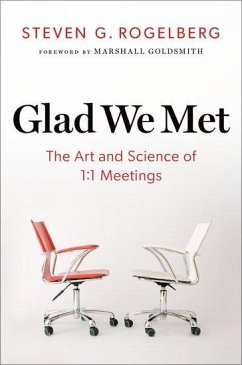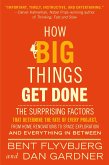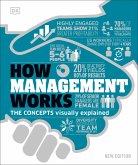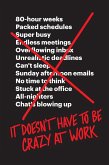Steven G. Rogelberg (Chancellor's Professor, Psychology, Management
Glad We Met
The Art and Science of 1:1 Meetings
20,99 €
inkl. MwSt.
Sofort lieferbar

10 °P sammeln
Steven G. Rogelberg (Chancellor's Professor, Psychology, Management
Glad We Met
The Art and Science of 1:1 Meetings
- Gebundenes Buch
- Merkliste
- Auf die Merkliste
- Bewerten Bewerten
- Teilen
- Produkt teilen
- Produkterinnerung
- Produkterinnerung
This book provides concrete evidence-based recommendations and solutions for how managers, coaches, and leaders can implement and tap into the amazing potential of 1:1 meetings while avoiding common pitfalls.
Andere Kunden interessierten sich auch für
![How Big Things Get Done How Big Things Get Done]() Bent FlyvbjergHow Big Things Get Done9,99 €
Bent FlyvbjergHow Big Things Get Done9,99 €![How Big Things Get Done How Big Things Get Done]() Bent FlyvbjergHow Big Things Get Done19,99 €
Bent FlyvbjergHow Big Things Get Done19,99 €![How Management Works How Management Works]() DKHow Management Works14,99 €
DKHow Management Works14,99 €![The Ethical Coaches' Handbook The Ethical Coaches' Handbook]() The Ethical Coaches' Handbook39,99 €
The Ethical Coaches' Handbook39,99 €![It Doesn't Have to Be Crazy at Work It Doesn't Have to Be Crazy at Work]() Jason FriedIt Doesn't Have to Be Crazy at Work12,99 €
Jason FriedIt Doesn't Have to Be Crazy at Work12,99 €![Neuroscience for Change at Work Neuroscience for Change at Work]() Tibisay VeraNeuroscience for Change at Work32,99 €
Tibisay VeraNeuroscience for Change at Work32,99 €![Human Resources for the Non-HR Manager Human Resources for the Non-HR Manager]() Carol T. KulikHuman Resources for the Non-HR Manager42,99 €
Carol T. KulikHuman Resources for the Non-HR Manager42,99 €-
-
-
This book provides concrete evidence-based recommendations and solutions for how managers, coaches, and leaders can implement and tap into the amazing potential of 1:1 meetings while avoiding common pitfalls.
Hinweis: Dieser Artikel kann nur an eine deutsche Lieferadresse ausgeliefert werden.
Hinweis: Dieser Artikel kann nur an eine deutsche Lieferadresse ausgeliefert werden.
Produktdetails
- Produktdetails
- Verlag: Oxford University Press Inc
- Seitenzahl: 248
- Erscheinungstermin: 9. Januar 2024
- Englisch
- Abmessung: 211mm x 147mm x 27mm
- Gewicht: 350g
- ISBN-13: 9780197641873
- ISBN-10: 0197641873
- Artikelnr.: 67861646
- Herstellerkennzeichnung
- Libri GmbH
- Europaallee 1
- 36244 Bad Hersfeld
- gpsr@libri.de
- Verlag: Oxford University Press Inc
- Seitenzahl: 248
- Erscheinungstermin: 9. Januar 2024
- Englisch
- Abmessung: 211mm x 147mm x 27mm
- Gewicht: 350g
- ISBN-13: 9780197641873
- ISBN-10: 0197641873
- Artikelnr.: 67861646
- Herstellerkennzeichnung
- Libri GmbH
- Europaallee 1
- 36244 Bad Hersfeld
- gpsr@libri.de
Dr. Steven G. Rogelberg, an organizational psychologist, holds the title of Chancellor's Professor at UNC Charlotte for distinguished national, international, and interdisciplinary contributions. He is an award-winning teacher and recipient of the very prestigious Humboldt Award for his research on meetings. His last book, The Surprising Science of Meetings: How You Can Lead Your Team to Peak Performance (Oxford) was recognized by the Washington Post as the "#1 Leadership Book to Watch for". He and the book were also featured on CBS This Morning, Freakonomics, HBR, NPR, WSJ, and BBC World to name a few. Adam Grant has called Steven the "world's leading expert on how to fix meetings". He was the inaugural winner of the Society for Industrial and Organizational Psychology (SIOP) Humanitarian Award and just finished his term as President of SIOP, the largest professional organization in the world for I-O psychology.
* Section 1: Background and Foundation
* Chapter 1 Brief introduction to 1:1s and the science underlying this
book
* Chapter 2 Why 1:1s
* Section 2: Organization for 1:1s
* Chapter 3 Messaging with team members
* Chapter 4 1:1 Meeting Frequency and Cadences
* Chapter 5 Logistics of 1:1s
* Chapter 6 Agendas and who "owns" the meeting
* Section 3: Carrying out 1:1s
* Chapter 7 Key skills, behaviors, and mindsets to make 1:1s work
* Chapter 8 Underlying keys to success
* Chapter 9 Successfully conducting/participating in the 1:1: Manager
perspective
* Chapter 10 Successfully conducting/participating the 1:1: Team member
perspective
* Section 4: Post meeting
* Chapter 11 Post meeting follow-up and tracking
* Chapter 12 Evaluating and improving your 1:1s
* Section 5: Special topics
* Chapter 13 Managing meeting load to lessen meeting burnout and
fatigue
* Chapter 14 Cross-cultural/gender/age differences in perspectives on
1:1s
* Chapter 15 Adapting book content to 1:1s with peers
* Chapter 16 Adapting book content to 1:1s with customers/clients
* Chapter 17 References
* Appendices
* Appendix 1: Summary checklist of 1:1 key dos
* Appendix 2: Summary checklist of 1:1 key don'ts
* Appendix 3: How to effectively give feedback
* Appendix 4: Keys to successful coaching/mentoring
* Appendix 5: Conducting a career conversation
* Appendix 6: Keys to taking notes efficiently while still being
present
* Appendix 7: Techniques for diffusing anger/defensiveness
* Appendix 8: Techniques for encouraging team members to share and
communicate candidly
* Appendix 9: Sample agenda templates for different types of meeting
* Weekly 1:1
* Peer-to-peer 1:1
* Sales/customer 1:1
* Debrief retrospective 1:1
* Skip level 1:1
* First 1:1 with a new employee
* Chapter 1 Brief introduction to 1:1s and the science underlying this
book
* Chapter 2 Why 1:1s
* Section 2: Organization for 1:1s
* Chapter 3 Messaging with team members
* Chapter 4 1:1 Meeting Frequency and Cadences
* Chapter 5 Logistics of 1:1s
* Chapter 6 Agendas and who "owns" the meeting
* Section 3: Carrying out 1:1s
* Chapter 7 Key skills, behaviors, and mindsets to make 1:1s work
* Chapter 8 Underlying keys to success
* Chapter 9 Successfully conducting/participating in the 1:1: Manager
perspective
* Chapter 10 Successfully conducting/participating the 1:1: Team member
perspective
* Section 4: Post meeting
* Chapter 11 Post meeting follow-up and tracking
* Chapter 12 Evaluating and improving your 1:1s
* Section 5: Special topics
* Chapter 13 Managing meeting load to lessen meeting burnout and
fatigue
* Chapter 14 Cross-cultural/gender/age differences in perspectives on
1:1s
* Chapter 15 Adapting book content to 1:1s with peers
* Chapter 16 Adapting book content to 1:1s with customers/clients
* Chapter 17 References
* Appendices
* Appendix 1: Summary checklist of 1:1 key dos
* Appendix 2: Summary checklist of 1:1 key don'ts
* Appendix 3: How to effectively give feedback
* Appendix 4: Keys to successful coaching/mentoring
* Appendix 5: Conducting a career conversation
* Appendix 6: Keys to taking notes efficiently while still being
present
* Appendix 7: Techniques for diffusing anger/defensiveness
* Appendix 8: Techniques for encouraging team members to share and
communicate candidly
* Appendix 9: Sample agenda templates for different types of meeting
* Weekly 1:1
* Peer-to-peer 1:1
* Sales/customer 1:1
* Debrief retrospective 1:1
* Skip level 1:1
* First 1:1 with a new employee
* Section 1: Background and Foundation
* Chapter 1 Brief introduction to 1:1s and the science underlying this
book
* Chapter 2 Why 1:1s
* Section 2: Organization for 1:1s
* Chapter 3 Messaging with team members
* Chapter 4 1:1 Meeting Frequency and Cadences
* Chapter 5 Logistics of 1:1s
* Chapter 6 Agendas and who "owns" the meeting
* Section 3: Carrying out 1:1s
* Chapter 7 Key skills, behaviors, and mindsets to make 1:1s work
* Chapter 8 Underlying keys to success
* Chapter 9 Successfully conducting/participating in the 1:1: Manager
perspective
* Chapter 10 Successfully conducting/participating the 1:1: Team member
perspective
* Section 4: Post meeting
* Chapter 11 Post meeting follow-up and tracking
* Chapter 12 Evaluating and improving your 1:1s
* Section 5: Special topics
* Chapter 13 Managing meeting load to lessen meeting burnout and
fatigue
* Chapter 14 Cross-cultural/gender/age differences in perspectives on
1:1s
* Chapter 15 Adapting book content to 1:1s with peers
* Chapter 16 Adapting book content to 1:1s with customers/clients
* Chapter 17 References
* Appendices
* Appendix 1: Summary checklist of 1:1 key dos
* Appendix 2: Summary checklist of 1:1 key don'ts
* Appendix 3: How to effectively give feedback
* Appendix 4: Keys to successful coaching/mentoring
* Appendix 5: Conducting a career conversation
* Appendix 6: Keys to taking notes efficiently while still being
present
* Appendix 7: Techniques for diffusing anger/defensiveness
* Appendix 8: Techniques for encouraging team members to share and
communicate candidly
* Appendix 9: Sample agenda templates for different types of meeting
* Weekly 1:1
* Peer-to-peer 1:1
* Sales/customer 1:1
* Debrief retrospective 1:1
* Skip level 1:1
* First 1:1 with a new employee
* Chapter 1 Brief introduction to 1:1s and the science underlying this
book
* Chapter 2 Why 1:1s
* Section 2: Organization for 1:1s
* Chapter 3 Messaging with team members
* Chapter 4 1:1 Meeting Frequency and Cadences
* Chapter 5 Logistics of 1:1s
* Chapter 6 Agendas and who "owns" the meeting
* Section 3: Carrying out 1:1s
* Chapter 7 Key skills, behaviors, and mindsets to make 1:1s work
* Chapter 8 Underlying keys to success
* Chapter 9 Successfully conducting/participating in the 1:1: Manager
perspective
* Chapter 10 Successfully conducting/participating the 1:1: Team member
perspective
* Section 4: Post meeting
* Chapter 11 Post meeting follow-up and tracking
* Chapter 12 Evaluating and improving your 1:1s
* Section 5: Special topics
* Chapter 13 Managing meeting load to lessen meeting burnout and
fatigue
* Chapter 14 Cross-cultural/gender/age differences in perspectives on
1:1s
* Chapter 15 Adapting book content to 1:1s with peers
* Chapter 16 Adapting book content to 1:1s with customers/clients
* Chapter 17 References
* Appendices
* Appendix 1: Summary checklist of 1:1 key dos
* Appendix 2: Summary checklist of 1:1 key don'ts
* Appendix 3: How to effectively give feedback
* Appendix 4: Keys to successful coaching/mentoring
* Appendix 5: Conducting a career conversation
* Appendix 6: Keys to taking notes efficiently while still being
present
* Appendix 7: Techniques for diffusing anger/defensiveness
* Appendix 8: Techniques for encouraging team members to share and
communicate candidly
* Appendix 9: Sample agenda templates for different types of meeting
* Weekly 1:1
* Peer-to-peer 1:1
* Sales/customer 1:1
* Debrief retrospective 1:1
* Skip level 1:1
* First 1:1 with a new employee







